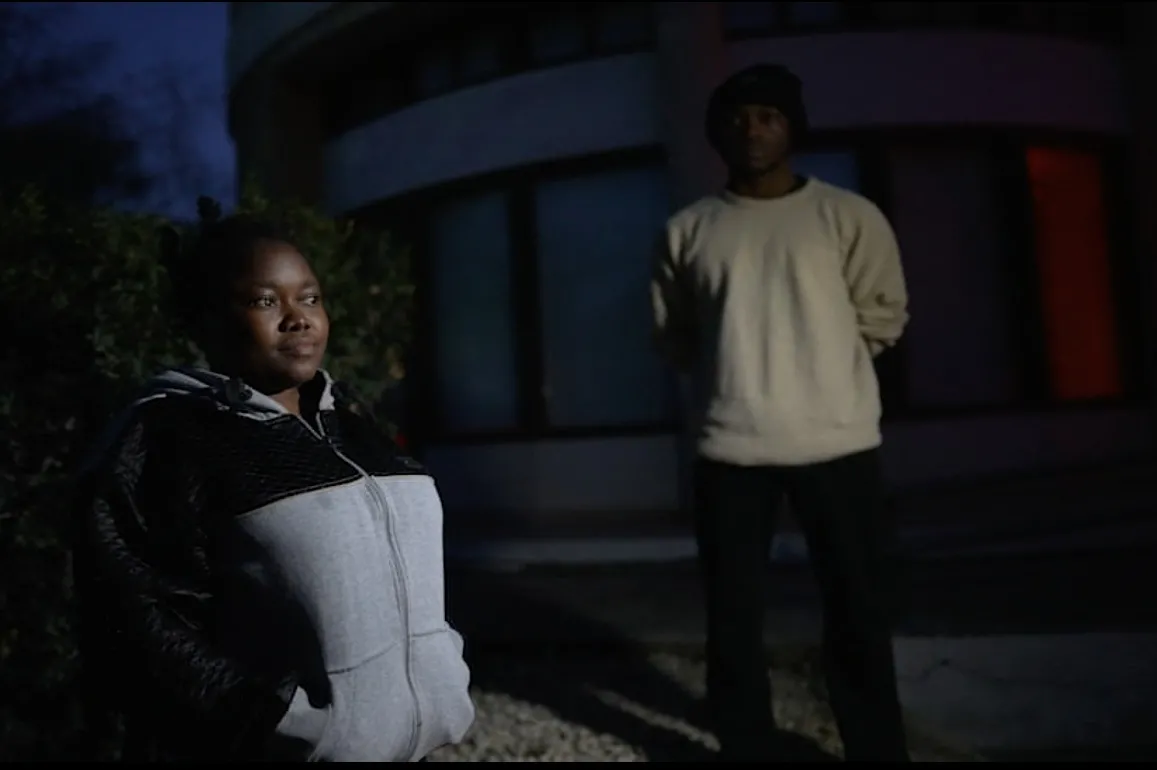 Parents protest the Montgomery County School Board’s policy blocking them from opting out their children from pro-homosexual and transgender materials. / Credit: Photo courtesy of Becket
Parents protest the Montgomery County School Board’s policy blocking them from opting out their children from pro-homosexual and transgender materials. / Credit: Photo courtesy of Becket
Washington, D.C. Newsroom, Dec 5, 2023 / 15:18 pm (CNA).
Attorneys for a group of over 300 primarily Catholic, Muslim, and Ethiopian Orthodox parents from Montgomery County, Maryland, argued in federal court today that the parents should be allowed to opt their children out of school reading materials promoting homosexuality and transgenderism.
According to an attorney representing the parents, the 4th Circuit Court of Appeals in Richmond, Virginia, expedited the case and scheduled the hearing promptly, signaling that a ruling in the case, Mahmoud v. McKnight, is a priority.
“Schools have no business pushing instruction on gender and sexuality without even notifying parents,” said attorney Eric Baxter from the law firm Becket in a Dec. 5 statement.
The parents sued the Montgomery County Board of Education on May 24 after it changed its parental notification and opt-out policies.
Under the new rule, which the board adopted on May 1, the school district will not notify parents about reading materials that portray or promote homosexuality, transgenderism, and other aspects of gender ideology and will no longer allow parents to opt out of such coursework.
“Parental involvement is crucial for children, especially in elementary school,” Baxter said. “The court should restore notice and opt-outs so parents can parent and kids can be kids.”
William Haun, a senior counsel at Becket and co-counsel in the Montgomery County parents’ case, told CNA that the appeals court seemed open to the parents’ arguments and that he is hopeful the court will restore their right to opt out.
Haun said that the parents are merely advocating for “the same opt-outs that the school board was giving parents all of last school year without incident.”
Though there have been protests and significant pushback against the school board’s rule change, a federal district judge ruled against the parents on Aug. 24, allowing the policy to go into effect at the beginning of the fall 2023 semester.
“What we have are parents who are being forced to decide, ‘Do I have to withdraw my children from public school or on pain of criminal penalties have my children be taught things that violate their religious beliefs?’” Haun said.
“The most troubling thing the parents told us is that they can’t even get a straight answer from their teachers about whether these books will ever be read or when they’ve been read,” he said.
Haun shared the story of one impacted family, the Morrisons, whose 10-year-old daughter has Down syndrome and attention deficit disorder. Even in her specialized courses, the Morrisons’ daughter has had pro-homosexual and transgender materials read to her, which Haun said has been “deeply confusing to her.”
Despite the ruling in August, Haun said the appeals court appeared open to the parents’ arguments and asked “many questions about the amount of discretion that the board has and its policies, the fact that the board allowed opt-outs through all of last year, and then also with regard to the age of the children.”
According to Haun, homosexual and transgender “pride” storybooks are being read to children in the Montgomery County school district as early as pre-K, to children who are 3 and 4 years old.
“When the board has the discretion to accommodate [religious requests] but refuses to do so, that triggers rigorous judicial review under the free exercise clause, and the board simply has no good response to that rigorous review,” Haun said.
Though this case primarily concerns parents and children in Montgomery County, Maryland, Haun said he believes it also has “tremendous national import.”
“If this is allowed to persist,” he said, “it’s going to send a message nationwide that that long-standing partnership between parents and public schools can be changed in favor of cutting the parents out to pursue an ideological agenda.”
As it stands currently, Haun said that 47 states still require either opt-outs or opt-ins whenever sexuality and gender family issues are being taught to children.
“That is a national consensus that is long-standing in our country,” Haun explained. “Montgomery County goes even further and allows for religious opt-outs to all manner of curriculum: Valentine’s Day, Halloween parties, any kind of reading assignment that offends your religious beliefs. You can work with them to come up with an alternative, but only for these books, for these books only, you won’t even be told when they’re read, and you can’t get an opt-out.”
Haun told CNA that the fact that the 4th Circuit Court expedited the hearing in this case indicates that the judges “see the need for an immediate ruling” and that he expects a ruling in the next couple of months.
[…]









Visits and councils create opportunities for prayer, discussions, sharing of viewpoints, discovering common paths, enhancing camaraderie, togetherness, and on-going-ness among fellow pilgrims engaged in a common journey on God’s Holy Ground.
During the council, the bishops condemned the heresy of Arianism, which asserted that the Son was created by the Father. Arius, a priest who faced excommunication for propagating the heresy, did not accept that the Son was coeternal with the Father (Tyler Arnold CNA).
The historical plot thickens with the heretical residue of distancing the flesh and blood Christ from the divine Word, addressed by St Cyril Patriarch of Alexandria’s anathema’s against Nestorius, Patriarch of Constantinople at Ephesus 431 AD. Controversy continued until Chalcedon 451 AD and Cyril’s formulation of the doctrine of two natures in Christ. Unfortunately the heresy continued to have purchase in the East. Earlier possibility of a Filioque clause, referring to the divinity of the Holy Spirit was discussed in context of its absence in the original 325 AD Nicene Credo during the Council of Constantinople 381. That Council was called by emperor Theodosius to settle the identity of Christ.
“The term ‘Filioque’ was first employed, referencing the divinity of the Holy Spirit in the Niceno-Constantinopolitan Creed in 589 AD at the Third Council of Toledo, but it may have been inserted later. The Church of Rome added the phrase ‘and the Son’ to the creed in the 11th century, giving it papal authority and making it definitive. Most scholars agree that the term was introduced during Benedict VIII’s reign 1014-15” (Google AI).
Filioque Clause perhaps for the Greek Orthodox the most controversial doctrine of the Latin Church has long been contested. Catholicism for example insists on a dogmatic doctrine of a complete human nature in the person Christ in context of two wills, one human one divine, which the Orthodox reject settling exclusively for a divine will [and as such refuse to accept the doctrine of the Holy Spirit proceeding from Christ].
A divine will is compatible with the Holy Spirit ‘poured out’ by Christ upon Mankind. As well as from the Father. Our solemnity of Pentecost celebrated by the Latin Church throughout the world makes that truth clear, that the Pouring out of the Holy Spirit upon Church and world is the gift of both Son and Father.
Addendum: The Filioque clause was indeed added to the Credo during the 381 AD Council of Constantinople [as I note in my book Assent to Truth]; however, not to the Nicene Credo, rather to the Credo of Constantinople.
A divine will and a human will in one person is compatible with the one Person Christ pouring the Holy Spirit upon Mankind. Whereas a person with simply one will that is divine, is compatible with the Holy Spirit poured out exclusively by the Father, the Son relegated to an inferior human person, which is the theological error of the Orthodox position.
Such an exclusivity of divine nature identified in the Word, or Father, also brings into question the validity of the Real Presence of Our Lord in the Holy Eucharist. Which was Cyril of Alexandria’s 11th Anathema against Nestorius, who denied communion with the divine presence when we consume the flesh of Jesus, flesh he assumed from the Blessed Virgin. As such Nestorius repudiated the belief that Mary was Mother of God.
Additionally it needs be said that the omission of a human will in Christ as held by the Orthodox diminishes the integrity of the hypostatic union itself, and with that the unity of the Trinity. For example, what is Man without a will? An ox, an antelope? Even they have an instinctive will. Furthermore, it contradicts Christ’s freely given assent to the Father in the Garden of Gethsemane regarding the crucifixion. All this impinges on the controversial Filioque Clause.
The Son of Man as Christ frequently refers to himself is not the divinity wrapped in a cloak of human flesh, rather the perfectly obedient son who ‘freely’ does the Father’s will and achieves our salvation. Who can promise us he will send us the advocate, the fire of the Holy Spirit on Pentecost.